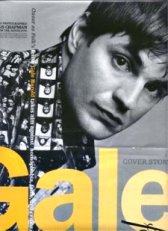News - Feature Stories - Magazine
- Gale Harold
Gale Force
“I think [today] it’s probably gotten easier and easier
for people to deal with,” he muses, “but it’s still a monumental
achievement for some people to say, ‘You’re gay, can we talk?’
They’re so scared, because they don’t know what it means about them,
about God. I would not want to be caught in the wrong place at the wrong time,
even now.”
 Likewise
on the playing field, where Harold was once forbidden to play soccer because
his hair was too long. The explanation was that it made him look unmasculine.
Furthermore, “because he took my side, our goalkeeper wasn’t allowed
to play either.” Harold sighs. “When you’re a kid you instinctively
know when someone’s blowing smoke up your ass. You react to it, or you
don’t.”
Likewise
on the playing field, where Harold was once forbidden to play soccer because
his hair was too long. The explanation was that it made him look unmasculine.
Furthermore, “because he took my side, our goalkeeper wasn’t allowed
to play either.” Harold sighs. “When you’re a kid you instinctively
know when someone’s blowing smoke up your ass. You react to it, or you
don’t.”
Atlanta, even then, was a culturally mixed city. The best record
stores were in gay neighborhoods, and Harold and his close friends would often
find themselves rifling through the stacks. “You look up and realize,
Oh, this is the deal,” he shrugs, recalling his nascent awareness of a
larger gay presence.
Closer to home he had friends he says he knew were gay. But it
wasn’t discussed. “Say I’m 15 years old,” he suggests,
remembering. “And I know you’re gay. And you know I know. We never
actually talk about it because you never bring it up, and I don’t feel
like invading whatever that might be. We’re not going to feel compelled
to go there. I never had one of those moments when someone came out to me as
a confidant,” he says. “The acknowledgment was already strong enough.
It wasn’t like they needed me to tell them that I knew.”
After high school, Harold won a soccer scholarship to American
University, but he dropped out after a year and moved to San Francisco, studying
fine arts at the San Francisco Art Institute. He supported himself with a series
of low-paying jobs tailor-made for a young man searching.
“I was waiting tables, taking out the trash, painting houses.
A bunch of menial shit,” he says cheerfully. As time passed, though, he
got restless: “I wasn’t looking [for a direction], and life had
started getting beyond the point of enjoyment, you know?” When a friend
asked him to appear in a movie (which, in the end, was never made), Harold’s
interest was piqued.
With the dot-coms booming, San Francisco was becoming too pricey.
When the building where he lived was sold and turned into a parking garage,
Harold took it as an omen. “I knew at some point I was going to have to
do something,” Harold says. He left for Los Angeles in 1997. “I’d
met an acting teacher there I was intrigued by, and I took a weeklong workshop,”
he recalls.
Page 1
. 2 . 3
. [4] . 5 . 6
 Likewise
on the playing field, where Harold was once forbidden to play soccer because
his hair was too long. The explanation was that it made him look unmasculine.
Furthermore, “because he took my side, our goalkeeper wasn’t allowed
to play either.” Harold sighs. “When you’re a kid you instinctively
know when someone’s blowing smoke up your ass. You react to it, or you
don’t.”
Likewise
on the playing field, where Harold was once forbidden to play soccer because
his hair was too long. The explanation was that it made him look unmasculine.
Furthermore, “because he took my side, our goalkeeper wasn’t allowed
to play either.” Harold sighs. “When you’re a kid you instinctively
know when someone’s blowing smoke up your ass. You react to it, or you
don’t.”